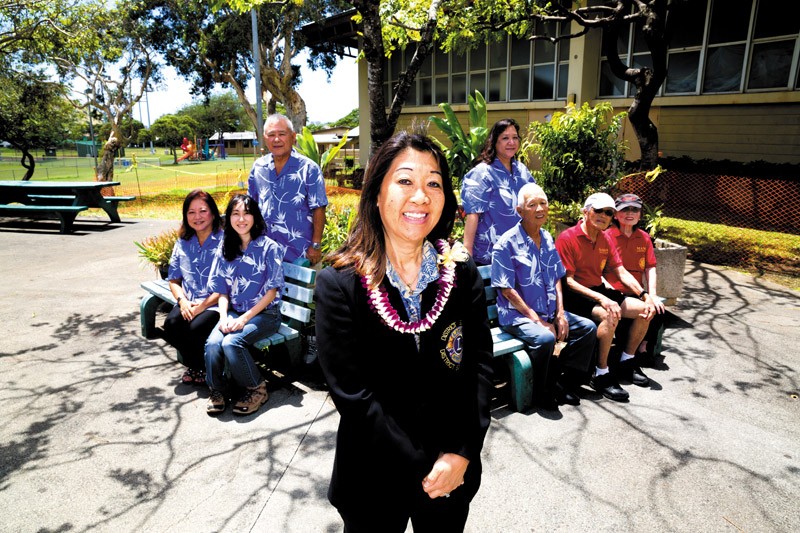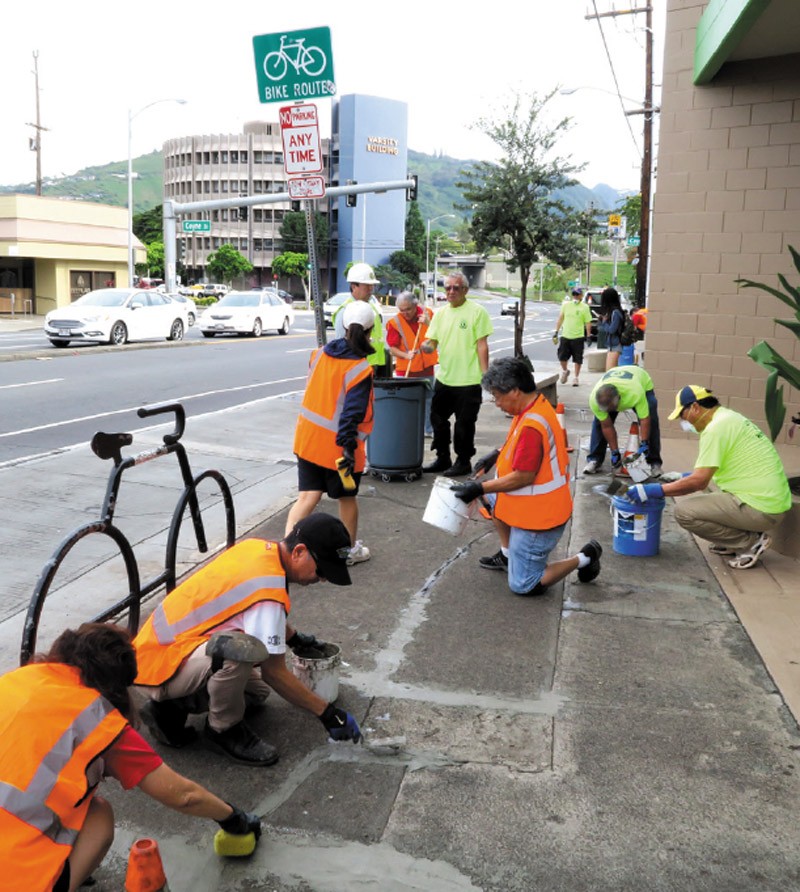100 Years Of Service

District 50 Hawaii Lions district governor Nadine Nishioka (center), with (from left) Kathryn Chung, Rachel Yamashita, Lawrence Agena, Leona Kobashigawa, Melvin Nakamura, and Tom and Karen Otaguro of Manoa Lions Club
To celebrate Lions Clubs International’s centennial, Hawaii Lions from all over the state will gather May 4-6 for a roaring good time and to prepare for 100 more years of “we serve”
Looking out over Manoa Valley District Park, members of Manoa Lions Club point out all the things in which their organization has had a hand.
There are the planter gardens near the gym. Then there are the benches they repainted. Up the hill, there’s the bus stop shelter they built. Down by the baseball fields, the shelter covering the bleachers. The fact that you now can drive through the park via a bypass road — that was them, too.
That exhaustive list of contributions at Manoa Valley District Park, it seems, is something of a microcosm of Lions Clubs International, a network of thousands of volunteer service clubs throughout the world. With the motto “we serve,” Lions Clubs address a wide range of needs. Locally, Hawaii Lions support nonprofits, revitalize schools and parks, cheer up keiki in the hospital, conduct cleanups, donate food to those in need and much more.
As Hawaii Lions district governor Nadine Nishioka neatly sums it up: “Whatever we can do to help, we will do.”
“Our goal is basically to serve the needs of the community,” adds Nishioka, a member of Manoa Lions Club.

Lions Clubs members gather regularly to repair sidewalks for their Safe Sidewalks project
PHOTO COURTESY DISTRICT 50 HAWAII LIONS
This year marks 100 years of service for Lions Clubs International. To celebrate, Hawaii Lions from clubs throughout the state are gathering on Oahu May 4-6 for a district-wide Centennial Convention, which features a game night and a banquet. Throughout the convention, they also will recognize the achievements of exemplary local Lions.
What has become a sprawling worldwide endeavor began with one Chicago businessman, Melvin Jones, in 1917, who asked a simple question: What if people put their talents to work improving their communities? Jones already was a member of a business club, so he encouraged the group to extend its focus to include community outreach, and then reached out to similar groups across the country to do the same. The groups all came together and formed Lions Clubs.
By 1920, Lions Clubs already were starting to sprout up around the world, and today, Lions Clubs International is comprised of 1.4 million members in more than 46,000 clubs.
Hawaii was established as District 50 of Lions Clubs International 90 years ago, when a member of another service organization fought to allow Lions to extend its membership beyond white men. Now, there are 61 Lions Clubs throughout the state, with about 2,000 members. Each has its own officers and directs its own projects based on the needs of its individual community.
“What we try to do is emphasize the club first — each club makes a decision and decides what their needs are,” Nishioka explains.
As district governor, Nishioka often travels the state to visit various clubs. At each meeting, she shouts into the crowd, “Where there is a need …” And the crowd responds, “There is a lion.”
It’s hardly hyperbole. Lions, it seems, are everywhere.
One of the initiatives that Lions are best known for is their effort surrounding vision. Internationally, Lions are known as “Knights of the Blind,” a designation that has stuck since 1925, when Helen Keller visited a Lions convention and challenged members to become “knights of the blind in the crusade against darkness.”
To that end, Lions regularly conduct vision and amblyopia screenings at schools, and collect eyeglass donations for developing countries through their annual Lions In Sight drive. Plus, they also run a program that provides financial assistance for parents to purchase eyeglasses for their keiki, as well as the Hawaii Lions Eye Bank and Makana Foundation, which harvests corneas for donations all over the country.
As Manoa Elementary health aide Malene Pang tells it, she’s not sure what the school would do without the Lions conducting vision screenings.
“It is a big help to the parents because some of them are maybe not even aware. We have come across several children with certain vision or hearing (troubles), and the parents would call in and thank us because they were not even aware that their child couldn’t see in class,” Pang says.
Local Lions Clubs also have a strong partnership with Hawaii Foodbank, conducting one large food drive annually, as well as making ongoing donations throughout the year.
“Not only have they done food drives, they also volunteer on annual Food Drive Day at different sites,” says Hawaii Foodbank food drive manager Kim Bartenstein.
Just since 2010, Lions have provided the equivalent of 12,697 meals to the food bank through monetary and food donations.
“When an organization comes to you and is so willing to take everything on, and make that delivery of food and money, it is beautiful,” Bartenstein says. “It not only helps us, but in the long run, it helps the community members and the people that we are feeding get the food and help they need.”
Repairs and beautification projects also are common Lions efforts, including beach cleanups, graffiti paint-overs and trash pickups at parks. And each month, clubs from throughout Oahu come together for their Safe Sidewalks project, where Lions patch up the cracks or smooth out uneven portions of sidewalks to ensure that passersby won’t trip.
With all of the work that Lions Clubs do, becoming a Lion is no easy feat.
Not only do Lions dedicate ample amounts of time to the club, but in many cases, they also generate their own funding. While local clubs can turn to Hawaii Lions Foundation, the charitable arm of the organization, for financial support, they also come up with much of their funds, either via fundraising events or even donating their own money.
“It is an organization where you pay to volunteer,” Nishioka says with a laugh.
Even apart from her work with Lions, Nishioka already is a tireless contributor to the community. Her day job is executive director of Moiliili Community Center, and she also is chairwoman for Hawaii Commission for National Community Service.
So it comes as a surprise that, when asked what made her want to become a Lion, Nishioka prefaces her response with this: “I will be totally honest with you.
“I initially joined Lions when I ran for public office,” she explains. “Some of my supporters said you should join, you can get your name out there. I didn’t really know what it was about.”
She continued her work with the club after her race was over, but for the first few years, she was busy with her job and didn’t focus on Lions too much. Sure, she would help out with various projects, but it wasn’t a priority.
That changed, though, when Nishioka led a hearing screening at an elementary school. After she finished screening a group of kids, Nishioka noticed that there was one girl off to the side. The teacher told her that the girl was special needs and didn’t have the concentration to participate. Nishioka pressed the issue — she didn’t want any student to feel left out — and at first it seemed like the teacher was right.
“She was in her own little world — looking around, she wouldn’t listen to what I had to say,” Nishioka recalls.
But Nishioka noticed the girl was humming a song that she happened to know. The song was in Japanese, so Nishioka started speaking to her in Japanese.
“Well, it turns out that this 9-year-old girl was not special ed. She was hearing impaired — she read her parents’ lips at home, and they only spoke Japanese,” Nishioka explains. “They misdiagnosed her.
“That is when I truly said, ‘that is how we can help — that is how we help as Lions.'”
The girl, Nishioka later learned, got hearing aids and went on to graduate at the top of her class.
Even with their already extensive list of duties, Lions always are thinking of new ways they can help, new causes they can address. For Nishioka, that is one of the reasons she chose to run for district governor.
“It gives me a platform to get a message out to everyone — it gives me the opportunity to suggest ideas to all the clubs,” Nishioka says. “As
district governor, I can say, ‘Why don’t we try this?'”
Nishioka has introduced two new committees that now are a part of Hawaii Lions. One, Lions With Heart, is a partnership with a local nonprofit to help teach children CPR and AED usage. The other, Knights of the Blind, supports those who are visually impaired and blind. Visually impaired herself — she suffers from retinitis pigmentosa and is legally blind in one eye — Nishioka is especially passionate about the cause.
“As Lions, we are known as Knights of the Blind all over the world. We are doing a lot (to prevent) blindness, but what can we do to actually help those who are visually impaired and blind?”
The committee advocates for descriptive visual aids in public places and at special events, and works to raise awareness about the needs of the blind community.
As part of the Lions’ Centennial Service Challenge, which began in 2015 and will wrap mid-2018, clubs have turned their focus to ramping up four areas of service: relieving hunger, engaging youth, vision and the environment.
As a part of the challenge, Lions internationally have served 148,856,307 people in those four realms.
When asked what a favorite project as a Lion has been, Nishioka draws a blank. She can’t think of one — not just one, she explains. There are simply too many.
There are all the revitalization projects they have done at the Manoa park. There was building showers for handicapped students at McKinley High, sewing pillows for people in the hospital, removing invasive species on Hawaii island. The list goes on.
And perhaps part of the reason that she can’t seem to pinpoint one memorable project is that, as a Lion, Nishioka is focused instead on the future and all the things that they still have left to accomplish.
“We want to grow our district and we want to increase the amount of clubs,” Nishioka says. “There are still certain areas in the state that don’t have Lions clubs, and it is hard for clubs to travel to help these smaller communities.
“Wherever there is a need, we are there to serve. It doesn’t matter what it is, we are there to help.”
For more information on District 50 Hawaii Lions, visit hawaiilions.org.






